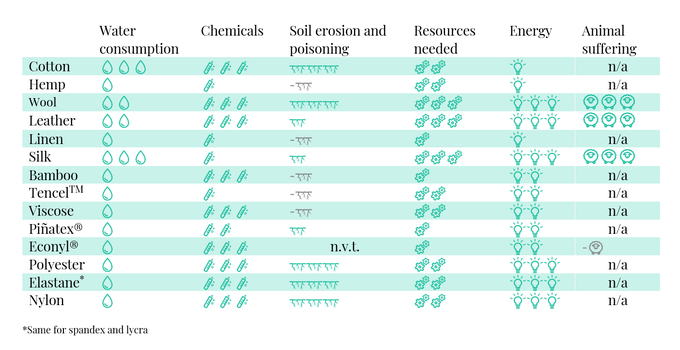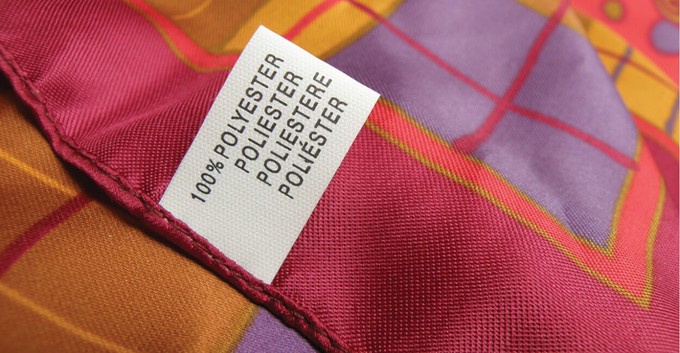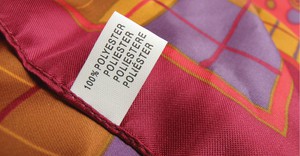- Clothes
- Bags
- Accessories
-
Inspiration
- Shoes
Polyester vs Cotton: Is the Latter REALLY More Sustainable?

We wouldn’t be surprised if you went to check your wardrobe and realised it’s mostly made up of these materials. Polyester and cotton are literally the two most common fabrics!
Is that a good thing, though, when it comes to sustainability? And, since cotton is a natural fabric, surely it’s more ethical than polyester, right?
Let’s see.
Polyester fabric and the environment
Polyester is a synthetic fibre (= created through chemical synthesis) derived from polyethylene terephthalate, a type of plastic.
Sustainability pros of polyester
- Polyester tends to be more durable than cotton, meaning less waste in theory (but it really depends on how a garment is manufactured: most fast fashion polyester clothes are designed to fall apart after a few wearings)
- Unlike cotton, polyester doesn’t require extensive use of land and water
Sustainability cons of polyester
- It derives from fossil fuels, and its manufacturing is responsible for 40% of all fashion’s carbon emissions
- It requires a chemical-heavy production process including toxic substances that pollute water
- When washed, polyester garments release microplastics, which end up in the ocean (and fishes’ bellies… and ours)
- It’s pretty much impossible to recycle
- It’s not biodegradable and can take 200 years to decompose
Cotton fabric and the environment

By now, you might think that the polyester vs cotton debate shouldn’t even be a question. After all, polyester has so many problems while the latter is a natural fabric.
However, most cotton crops are actually terrible for the planet, too!
Sustainability pros of cotton
- Because it’s a natural fabric, it’s renewable and doesn’t involve fossil fuels
- It can easily be recycled
- It’s biodegradable
Sustainability cons of cotton
- These crops use 6% of the world’s pesticides and 16% of all insecticides, which pollute surrounding waterways and groundwater
- It’s an extremely thirsty crop (think 2,700 litres for a single t-shirt!)
- As well as requiring extensive use of land, this all leads to soil degradation (= other plants will struggle or even fail to grow there)
- If treated with certain chemicals or mixed with polyester or other synthetic materials (polycotton is particularly common in fast fashion), it’s no longer biodegradable
So, is cotton more sustainable than polyester?

Here’s why the cotton vs polyester debate is tricky: it’s hard to tell whether cotton is indeed more sustainable than polyester since they both present different problems for the environment.
Each of them is better than the other for certain reasons and… much worse for others!
To put the polyester vs cotton fabric comparison into perspective, you can refer to this tab:

So, if polyester and cotton are both such problematic fabrics, does that mean you should always avoid them?
Well, what we can recommend is to look for their most sustainable counterparts whenever possible.
Two more sustainable options: organic cotton and recycled polyester
More and more fairtrade brands have been relying on these materials instead.
Organic cotton fabric
It’s much more sustainable than conventional cotton because:
- No pesticides are involved
- It promotes soil regeneration
- It includes natural or water-based dyes
- It requires 91% less water
Recycled polyester
It isn’t perfect because we’re still talking about a plastic-based fabric that isn’t biodegradable and releases microplastics. However, it’s more sustainable than virgin polyester because it reduces:
- energy use by 50%
- carbon emissions by 75%
- water consumption by 90%
- plastic waste by turning it into a fibre (1 kg of recycled polyester saves 60 plastic bottles from landfills or oceans)
So, our answer to the polyester vs cotton debate is that neither of them is that sustainable. So, whenever possible, consider opting for their recycled and organic counterparts instead.
Found this useful? Start receiving our tips and inspiration to make more ethical fashion choices.
Share our story
Related articles
Polyester vs Recycled Polyester: Is the Latter Eco-Friendly?
Does using plastic bottles and fishnets make this material more sustainable? Let’s look into virgin polyester vs recycled polyester clothing to find out.
Polyester Problems: Cheap Fabric, High Environmental Cost
What’s behind a £4 synthetic dress? Plastic, toxic chemicals, and fossil fuels, to name a few. Discover why polyester and sustainability rarely go together.
Conventional Cotton vs Organic Cotton: Differences & Sustainability
Sadly, natural doesn’t automatically mean sustainable, and that’s the case with cotton. Discover the differences between conventional cotton vs organic cotton!
Project Cece is a platform that collects ethical fashion from vetted brands and shops in one place. Browse ethical fashion for women and men and find items that fit your style, budget and values!






